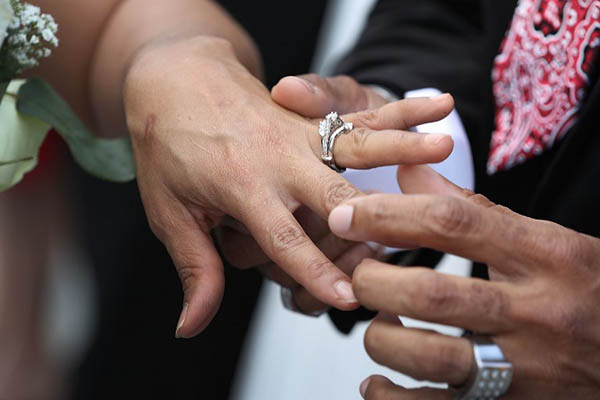
File photo. Joe Raedle-Getty Images North America—AFP
State sanctioned attacks on individual liberties in BJP-led India highlight widening fissures in the country’s claims of secularism
There has been little criticism in India of what the ruling Bharatiya Janata Party (BJP)’s “love jihad” is doing to Hindu girls in the province of Uttar Pradesh. Even champions of women’s rights are somehow too scared or too “Hinduized” to come out and protest married girls being dragged to lockups for the “crime” of marrying Muslim boys. Last month, gutsy journalist Tavleen Singh, known for her outspokenness, finally came out and wrote in the Indian Express about the cruelty with which Pinki, 22, of Moradabad has been treated.
Hindu girl Pinki married a Muslim boy long before the BJP issued an ordinance in Uttar Pradesh banning Muslim men from marrying Hindu women, calling the practice “love jihad,” an insulting formulation against Islam itself and the large Muslim minority living in India. The couple was picked up by BJP workers who claim to be “helping the law” when she went to register her marriage to her husband. Singh, whose son Aatish Taseer has become a journalist of great professional honesty in his mother’s example, reports that “Pinki was locked up in a Nari Niketan facility for 10 days” where “she was tortured and put under such stress that she had a miscarriage.”
Singh is shocked by what India is doing in the name of religion. Long proud of its status as a secular state, Indians heralded Hinduism as a religion of tolerance and spirituality. She worries “that laws are being passed that specifically target women’s rights that our usually vocal feminists are mysteriously silent [about].” She challenges women’s rights activists to come out and protest “the Hindutva movement in Modi’s new India” as well as BJP politicians whose “minds seem pickled in a mythical past which they believe was glorious and unpolluted by marauding Muslim men.”
Unlike Pakistan, where laws have been enacted to short-change its non-Muslim citizens, India is doing all this while its constitution remains secular, as written by Dalit leader Dr. Ambedkar, and amended by Prime Minister Indira Gandhi who finally inserted the word “secular” into it.
Singh writes: “All Indian women of every caste and creed technically have the fundamental right to choose who they marry. But for decades after India became a modern republic, this basic right was denied to young girls by parents of primitive mindset. In recent times, things have changed, especially in small towns and big cities. Girls have taken to choosing their own husbands instead of being forced into arranged marriages. This is good. It indicates that women are now aware enough not to be treated as chattel.”
The expression “love jihad” was coined by a primitive mind—debasing love as well as religion; and the courts in India are not in a hurry to come to the help of its victims; people who haven’t suffered from any “Muslim crime” but of the laws enforced by Hindutva. The higher courts have stayed punishments under this cruel “legislation”; but Hindu girls, not enjoying “upper class” privilege of “immunity,” have been made to suffer while their Muslim husbands are given a thrashing by Hindutva hoods.
Singh observes: “In the seventies, when Pakistanis first started coming to India to play cricket and talk of peace, I remember that it was the women who were truly dazzled by the freedom Indian women enjoyed. They were fascinated that Indian women could work in jobs that in their country only men did and delighted that they could dress the way they wanted and live life on their own terms. Pakistani men thought this was a bad thing and blamed it on evil western influence. I remember being shocked to hear this from men who were themselves educated in western universities.”
Her last observation: “What worries me today is that we seem in India to be regressing into a Hindu version of Pakistan.” This is a common refrain from Indians, who perhaps are unaware that in Pakistan—at least—the state does not officially sanction the kind of regression nakedly visible in today’s India. It is undeniable that in Pakistan’s Sindh Hindu girls are at times forced into marriage by criminally-minded Muslim men; but this activity is against the law—unlike India—and Muslim men who do this are picked up by the police and thrown into prison. There is no doubt that some cases reveal negligence on the part of the state; but social reaction in sympathy with the wronged Hindu girl is quite pronounced. Unlike the Indian judges who seem to favor action taken under Hindutva, the magistrates in Pakistan don’t favor the offenders.
Foreign Affairs magazine wrote in February 2020: “For more than a decade, rightwing Hindu groups in India have conjured the specter of a ‘love jihad’ among Muslim men: a campaign to court Hindu women with the intention of converting them to Islam. Under the leadership of the Hindu nationalist Bharatiya Janata Party, the state of Uttar Pradesh—home to India’s largest Muslim population—passed a law in November that imposes stringent punishments against religious conversion as part of marriage. Four other BJP-run states promise to follow suit.
“Where the BJP claims to see smoke, there is no fire. Interfaith marriages in India are fairly uncommon. Most Indians marry within their religion and their caste groups. A 2013 study found that less than five percent of Indians marry outside their caste and just over two percent of women between the ages of 15 and 49 had married outside their religions.” It is clear that whatever is happening in India is not its transformation into a “Hindu Pakistan,” but rather a far harsher regression, where the state officially sanctions attacks on the basic rights of its minorities.
